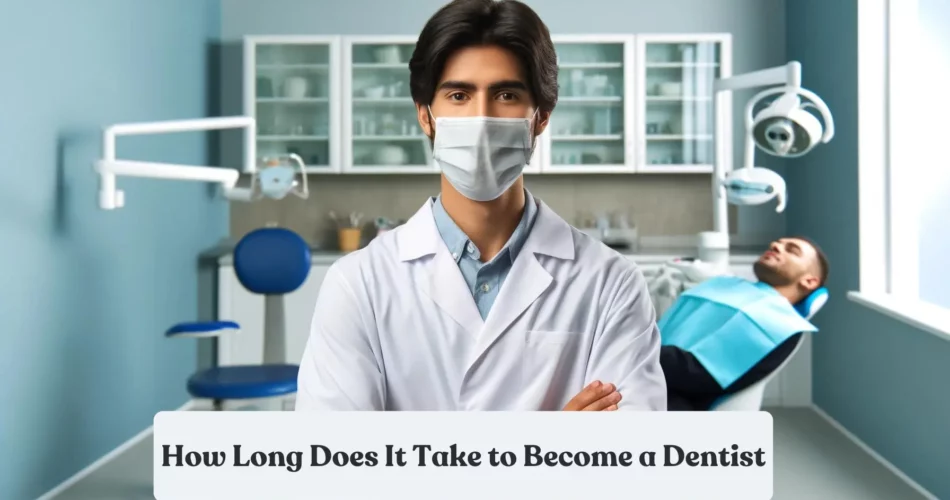Table of Contents
Medical students often inquire how long does it take to become a dentist. This field demands almost eight years of study with an area of expertise. Dentists ensure that patients receive the best treatment for oral health. They assess dental issues using diagnostic methods and work to avoid oral diseases. Further, gum disease, calculus bridge, damaged and misaligned teeth, or tooth bone loss are all issues that dentists address. The precise path you take to become a dentist depends on several variables. It includes whether or not you specialize in the area of study. However, a hybrid academic program can help students decide to minimize their degree time.
How Long Does It Take to Become a Dentist
Let’s consider a few steps that ultimately influence the key to how long does it take to become a dentist.
Complete Your Bachelor’s Program
Obtaining an undergraduate degree is mandatory for admission to dental schools. At the same time, most dental schools don’t enforce specific majors. So, having a science degree can confirm that you have finished the subject.
A few institutes provide pre-dental courses to ensure students take relevant courses like anatomy. These usually require four years to complete. However, students in such courses or those with prior credits may graduate sooner.
Conduct the DAT
The Dental Admission Test (DAT) is required to qualify for any dentistry institute. This MCQ-based exam assesses quantitative reasoning and perceptual skills. It also includes sections for reading comprehension and insights into natural sciences.
Earn a Dentistry Degree
Some dental colleges lead to a Doctor of Dental Medicine degree. While others award degrees in Doctor of Dental Surgery. The academic conditions for both are the same and accepted by licensing boards.
Further, dental programs usually consist of lab practices and active instruction with models. Under supervision, the students can assist in treating dental patients with root canals, bad breath, cavities, etc. Hence, most states mandate that dental students have a degree accredited by the CDA.
Complete an Internship
To become ready for a career in dentistry, ending an internship, clinical, or field experience is highly advised. These prospects provide you with lab research and other dental-related fields. Thus, internships prove helpful if you intend to work in a specialty area of dentistry.
Pass a Clinical Examination
In most states, you must pass a clinical exam, the written exam, and other requisites. Based on your state’s laws, clinical exams will occur over two or three days. However, the test can even occur over your final year of dental school.
Pass the INBDE
The INBDE is a two-day test conducted by the National Dental Examinations to evaluate your clinical abilities and basic learning and determine whether you are prepared to practice dentistry.
Obtain Licensure
The licensing board in your state will accept your application for a license if you have fulfilled the necessities for schooling and testing. Thus, the ADA keeps every dental licensing board listed in its database.
Pursue a Specialty
You must finish a course of study to gain more insight into your chosen career path if you intend to work in expertise—these programs normally last one to two years. Still, longer internships can be required for deeper specialties. There are twelve certifying boards for dental specialties, and each has distinct credential criteria.
It takes more time to specialize in each area. Studying orthodontics and pediatric dentistry takes two to three years. Four to six years of study are added for oral and maxillofacial surgery. Studying periodontics adds three years, and prosthodontics adds four to six years. Studying endodontics and dentist anesthesia takes two to three years. It now all depends on your time choices and areas of interest.
Factors Affecting Timeline
Not very much, but some factors can affect how long does it take to become a dentist.
Type of Program
A few students will first complete four years of undergraduate study and four years of dentistry school to pursue careers as dentists. A Doctor of Medicine in Dentistry or Dental Surgery is an option. So, they can finish dental programs, including dentistry, with a bachelor’s degree in seven years or less.
Dental Speciality
Your decision to specialize in a particular dentistry area will also affect your timetable, as fields require extra training.
Undergraduate Major
How long does it take to become a dentist also depends on your chosen major. For example, if students want to take fewer classes in dentistry school, they must opt to major in biology, chemistry, or pre-medicine during their prior studies.
Application Results
The dentistry school admissions process can be rigorous. Students must have a high GPA and approval from prior academics or teachers. Likewise, they should have a minimum provincial exam score.
Financial Considerations
To become a dentist, one must invest time and money. Tuition, application fees, test and exam prep charges, living costs, and other expenses can add up. Choosing a field of expertise will increase this amount. But it also offers the added benefit of higher potential profits.
Conclusion
The answer appears plain and simple: how long does it take to become a dentist? After high school, you must spend about eight years in education to become a certified dentist. During four of the eight years, a bachelor’s degree is achieved. The remaining four are devoted to dental school. But things aren’t usually that simple. A few more years may pass if you pursue an advanced specialty.
FAQs About How Long Does It Take to Become a Dentist
What is the timeline for a dental school program?
General dentist training normally takes eight years. If you choose to specialize, the training can take up to ten or even fourteen years. You might be able to complete some faster courses in seven years.
What is the duration of dentistry school?
A compulsory period of four years must pass between undergrad and dental school. To specialize, you must spend an extra two to three years finishing the program.
I hope you enjoy our article. Do check out more of our amazing articles.

